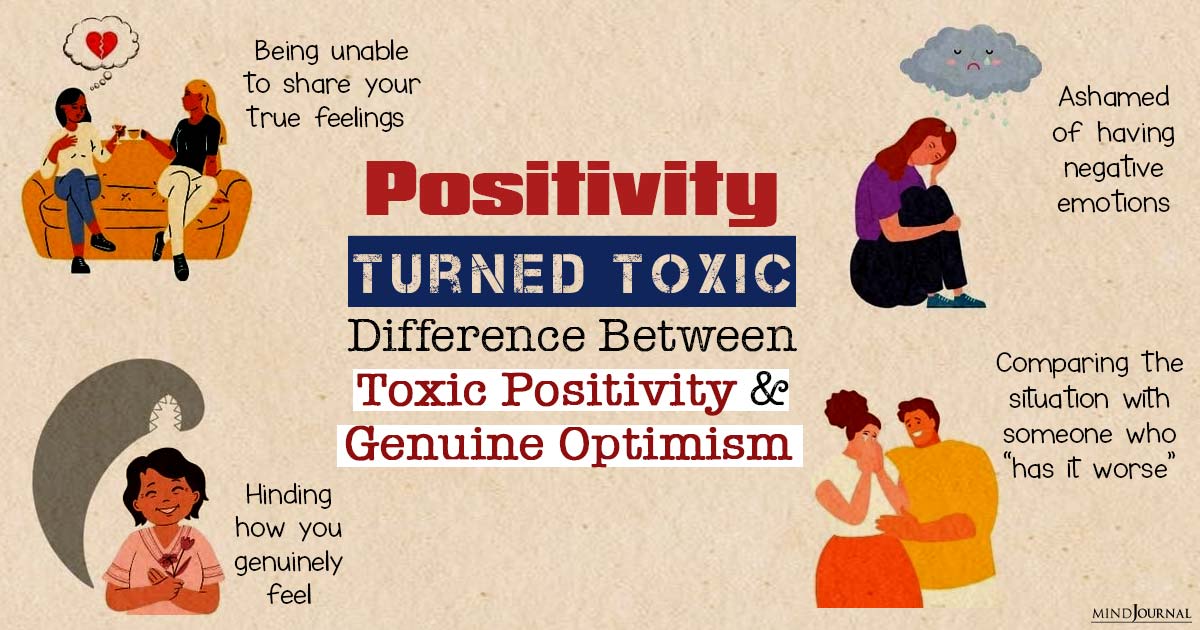To keep your hopes high in this competitive world is not easy. To be hopeful in all situations without dreading “what might come next?” is a rare positive mindset I lack. I started digging deep into the topic of toxic positivity vs genuine optimism through my phase of acceptance and denials.
But I often feel pressurized by narratives like “Be happy no matter what.” There are situations where I cannot apply: ” When life gives you lemons, make a lemonade.”
Moreover, it is more pressurizing to try and identify positive points in such situations. Failing to do so sometimes results in rumination, which is detrimental to mental health.
While searching for how to approach a situation and wondering why I cannot think positively in a situation, it took me closer to the difference between toxic positivity and genuine optimism.
Toxic Positivity Vs Genuine Optimism : Understanding the difference
Understanding the difference was not easy and instantaneous. It took introspection and recognition of my emotions. Here is what I realized:
What is toxic Positivity?
Toxic positivity is when you are supposed to have a positive mindset in an adverse situation. It is a dysfunctional emotional management that dismisses negative emotions to maintain a facade of positivity.
Your feelings can tell you when it is toxic positivity or genuine optimism. Toxic positivity makes you feel bad and hopeless. Hence toxic positivity vs genuine optimism is a topic many are trying to understand.
Dismaying negative emotions by rule can stop you from self-reflecting and introspecting to understand your role in a situation that has upset you. It can stop you from discussing and accepting how you might have hurt others’ feelings.

Hence, it is a recipe for living in denial.
Toxic positivity can hamper communication and relationships. Your partner can feel alone with their hurt and choose to leave the relationship.
Is this how you want your relationships to be?
Related: Toxic Positivity: Why It Is Not Always A Good Thing
What is genuine optimism?
Genuine optimism does not insist on masking feelings to be cheerful. It allows us to face all emotions patiently and to accept reality as it is. Authentic optimism is about being hopeful in a situation while accepting reality.

It supports a positive approach to adverse situations. It is not ” be happy no matter what,” it is more “it is okay to feel bad but focus on the lesson.”
It allows you to understand and accept your emotions. It nurtures your critical thinking abilities for making the right decisions in life.
Genuine optimism never feels forced upon.
Hence in the debate of toxic positivity vs genuine optimism, genuine optimism should be the clear choice.
Related: How To Shift Your Mindset Towards More Optimism and Happiness
Toxic Positivity Vs Genuine Optimism: 3 notable differences
You can understand the difference by how the responses make you feel.
1. “Others suffer more than you” Vs “Your pain is valid and it matters”
Comparing struggles compounds it. The first statement fills you up with denial. You feel pressured to explain why you cannot be positive at that moment. This is a classic example of toxic positivity vs genuine optimism.
But when someone acknowledges your pain, you feel relieved, supported, heard, and understood.
2. “Feeling sad does not help” Vs ” It is okay to feel low”
This is another common example of toxic positivity vs genuine optimism. Feeling low is as natural as feeling happy. It is not “a problem” that needs fixing! But forcing someone to act unnaturally cheerful is harmful.
When you hear affirmations like “It is okay to feel low,” you can start accepting your emotions and eventually make peace with them.
3. ” Be out with friends” Vs ” You can rest and be alone”
Spending time with yourself is not a negative aspect. You might have heard people asking you to hang out with friends, which made you over-explain your emotions, which no one paid heed to.
But it is much more comforting if someone supports your emotions and does not force you to act happy for the sake of “being positive”
These examples of toxic positivity vs genuine optimism will help you understand how to respond to situations and people’s remarks. Genuine optimism is being kind to yourself.
Now, that you know the differences, you can embrace genuine optimism over toxic positivity.
3 easy Steps to Embrace Genuine Optimism
Genuine optimism can change the quality of your life and here are a few ways you can start to embrace it:
1. Don’t run away from negative emotions
Negative emotions are natural. They need to be accepted to understand and deal with them. It is unhealthy to suppress negative emotions.
2. Rectify negative thinking patterns
Although it is natural to have negative emotions, it can turn into negative thought patterns, where you imagine the worst-case scenarios. It is not your fault, but it is better to change it. Search for an alternative thought instead!
3. Express and seek help
Always try to constructively express your emotions even when no one likes to hear them or tries to shut you down. Seek help if you feel hopeless and depressed.
Final take
I think it is fair enough to say that genuine optimism is the winner in toxic positivity vs genuine optimism. The chronic toxic positive approach is not only harmful but stops people from self-reflecting, which is essential for fostering relationships further in life. Breaking through this rigid binary of happiness and sadness will help you grow.
What causes toxic positivity?
It can be an outcome of social conditioning or stigmas related to seeking help.
Is toxic positivity a form of gas lighting?
Yes, if someone’s toxic positivity denies or questions your reality, it can be a form of gaslighting.
What people choose toxic positivity?
It is a coping mechanism to avoid stress instead of facing a complex and difficult emotion.
Can optimism turn toxic?
yes, when optimism changes from accepting reality to dissociating from reality to feel better.










Leave a Reply